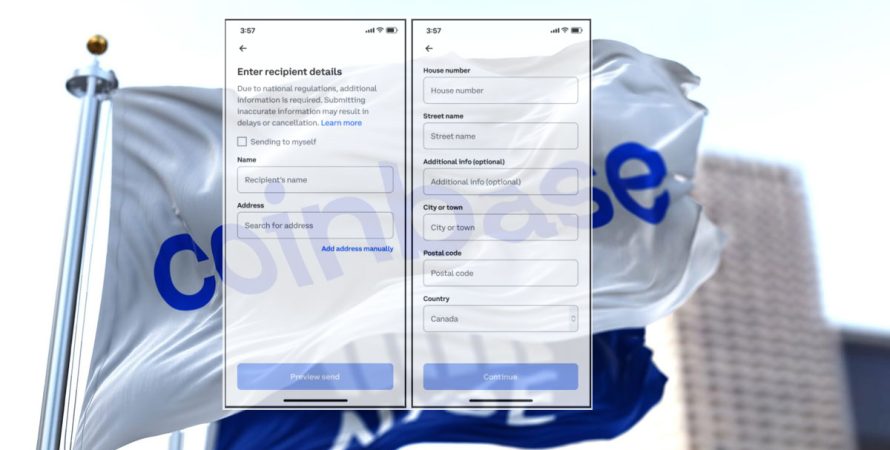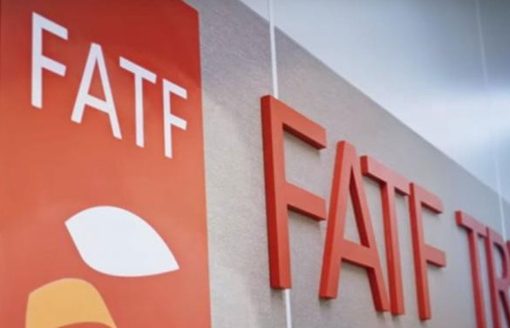Coinbase, a global cryptocurrency exchange, announced last Friday that it plans to collect additional information from its customers based in Canada, Singapore, and Japan.
Coinbase said that starting from April 1, the exchange will request regional users from Canada, Singapore, and Japan to provide additional information about the recipient for every transaction (transfer of crypto funds to financial institutions or exchanges).
The exchange has been sending notifications to its customers in those countries that the changes will take effect in early April to comply with local regulations.
The latest announcement will require Canadian users, who send more than 1,000 Canadian dollars (about $798) in cryptocurrency to financial entities or other crypto exchanges, to provide the name and address of the recipient every time they are doing transactions. This will take effect beginning April 4, as Coinbase cited Canada’s FINTRAC (Financial Transactions and Reports Analysis Centre of Canada) regulations as reasons for the change. The FINTRAC is Canada’s financial intelligence unit.
Coinbase further stated that it would require all Singapore users who transfer cryptocurrency from their Coinbase exchange wallets to external addresses to provide the recipient’s full name and country of residence whenever they are doing trading activities. Coinbase said that the rule has been approved by local Singapore regulations, which will take effect on April 1.
Likewise, Japanese users, who transfer encrypted assets to recipients outside Japan, are required to provide the recipient’s name, address, and destination wallet. According to the new regulations approved by the Japan Cryptocurrency Exchange Association (JVCEA), a self-regulation entity for the Japanese cryptocurrency industry. The new rule will start taking effect on April 1, Coinbase stated.
Support CryptoCaster with any amount of Bitcoin by copying and pasting our Unstoppable Domain; villagewest.crypto in your sending wallet or crypto coin exchange.
Your contribution support will help in our growth, coverage, and global presence. CryptoCaster is a decentralized publisher “Covering a Global Evolution Re-defining Mediums Of Exchange”. We will continue to upgrade and create impactful sections to our lineup.
Any amount, as often as you can contribute will be greatly appreciated.
Every contribution, however big or small, is so valuable for our future. Thank you for your consideration and support!
Member of Global Meta Media Consortium℠ – www.g2mc.world
In a statement, Coinbase spokesperson said: “We adhere to the laws in the jurisdictions in which we operate. While we will always advocate for what we think the laws should be, we must respect the laws that exist if we want to offer the suite of Coinbase services to customers in that country. I also want to make it clear that these changes, as outlined in our FAQ, only apply to Canada, Singapore, and Japan, where the laws require us to collect additional information. We are not applying this globally to customers.”
Joining Hands to Fight Crypto Crimes
In February last year, Coinbase joined a group of well-established firms active in cryptocurrencies in the U.S., including Fidelity and Robinhood, to comply with digital assets trading activities with global anti-money laundering (AML) rules. Coinbase and other fintech companies developed a way to comply with federal regulations, automatically linking sender and receiver info with cryptocurrency transactions of $3,000 or more.
A key component of such AML requirements is the Financial Action Task Force’s “Travel Rule,” which states that all cryptocurrency transactions above a certain amount must be accompanied by identifying information.
Early this month, Coinbase blocked 25,000 wallet addresses related to Russian individuals or entities it identified to have engaged in illicit activity. The exchange blocked the addresses over fears that cryptocurrency could be used to evade sanctions as part of efforts to comply with new regulations imposed because of a Russian invasion of Ukraine. The U.S. government had asked cryptocurrency platforms to help ensure Russian oligarchs could not use digital currencies to avoid sanctions. ![]()
Please Read Essential Disclaimer Information Here.
© 2024 Crypto Caster provides information. CryptoCaster.world does not provide investment advice. Do your research before taking a market position on the purchase of cryptocurrency and other asset classes. Past performance of any asset is not indicative of future results. All rights reserved.
Contribute to CryptoCaster℠ Via Metamask or favorite wallet. Send Coin/Token to Addresses Provided Below.
Thank you!
BTC – bc1qgdnd752esyl4jv6nhz3ypuzwa6wav9wuzaeg9g
ETH – 0x7D8D76E60bFF59c5295Aa1b39D651f6735D6413D
MATIC – 0x7D8D76E60bFF59c5295Aa1b39D651f6735D6413D
LITECOIN – ltc1qxsgp5fykl0007hnwgl93zr9vngwd2jxwlddvqt






